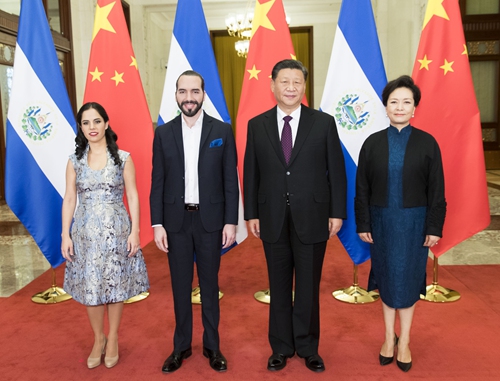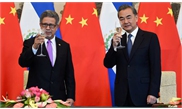China-El Salvador ties hailed
China helps nations out of Monroe Doctrine trap: expert

Chinese President Xi Jinping and his wife Peng Liyuan pose for a photo with El Salvador President Nayib Bukele and his wife Gabriela Rodríguez de Bukele at Great Hall of the People in Beijing on Tuesday. Photo: Xinhua
Chinese President Xi Jinping met El Salvador President Nayib Bukele in Beijing on Tuesday and a senior diplomat of Chinese foreign ministry said after the meeting that China is helping Latin American countries, including El Salvador, to solve problems caused by the US Monroe Doctrine, but China also supports them to develop ties with Washington.
Xi and Bukele witnessed the signing of cooperation documents covering the economy, technology, tourism, sports and agriculture, said Director General Zhao Bentang of Department of Latin American and Caribbean Affairs, China's Foreign Ministry after the two leaders met.
El Salvador showed its willingness to actively participate in the China-proposed Belt and Road Initiative, as Bukele, 38, who won the presidential election in February and took office on June 1, made his first state visit to China.
The Central American country cut off so-called "diplomatic ties" with Taiwan Island in August 2018, and established formal diplomatic ties with the People's Republic of China (PRC) in the same month.
A report of the Voice of America on May 24 quoted a newly elected Salvadoran senior official Félix Ulloa as saying at an event in Washington that the new government won't rule out the possibility of rebuilding "diplomatic ties" with Taiwan Island.
But the facts proved that relations between China and El Salvador are solid and developing, and China, unlike the US, has never forced any country to choose between Beijing and Washington, Chinese experts said.
Due to the country's formal diplomatic ties with the PRC, the US has expressed heavy criticism and even once called back its ambassador from the country, the VOA reported.
Jiang Shixue, director of the Center for Latin American Studies at Shanghai University, who visited El Salvador in April with an academic delegation, told the Global Times on Tuesday that "in April, the diplomats we met in El Salvador said they are unclear with the new government's stance toward China, but now we can see that the concern has disappeared."
Some politicians of Latin American countries such as from El Salvador and Brazil had said something negative about China during election campaigns, but they eventually chose to cooperate with China since they have to realize economic development for their people, which the US can't offer, Jiang said.
"This proves that China has an obvious advantage in using its huge market to trade with other countries, and even helps others solve economic development problems, so that it can reinforce ties with its partners and prevent external interruptions."
The Xinhua News Agency reported Xi said during his meeting with Bukele that China is willing to import high quality agriculture products from El Salvador, including sugar and coffee.
Xinhua reported on Tuesday that Chinese Premier Li Keqiang and Li Zhanshu, chairman of the National People's Congress Standing Committee, also met Bukele separately during his visit. The Central American country's president also went to Tian'anmen Square on Tuesday afternoon and laid a wreath at the Monument to the People's Heroes.

A vendor sells fruits on a street in San Salvador, El Salvador. Photo: Xing Xiaojing/GT
Monroe Doctrine impact
On China's reaction to the US warning Bukele of his visit to China, Zhao noted that China-El Salvador relations are not targeting any third party, and China also supports other countries, including El Salvador, developing ties with the US, which is totally different from the US attitude.
Many Latin American countries are suffering from economic problems, like the middle-income trap and financial crisis trap, and anyone familiar with history will understand that the main reason for all of these woes is the Monroe Doctrine, which treats Latin American countries as the US' backyard, Zhao noted.
China is helping them realize self-dependence, which "provides a ladder for them to get out from those traps," he said.
Li Haidong, a professor at the China Foreign Affairs University's Institute of International Relations, told the Global Times on Tuesday that the US is getting used to playing a master to lecture Latin American countries and tell them what to do in different fields. But Washington should realize that its image among Latin America is declining, since many countries in this region don't want to be the US' backyard, if they had a choice.
"Even some small countries, like El Salvador and Panama, have already refused to follow Washington's instructions on foreign affairs, and established diplomatic ties with China. They know that following the US has nothing to offer anymore, but China can offer a lot, including a market, investment and infrastructure construction," he said.
Zhao said El Salvador is just doing the same thing the US did 40 years ago (establishing formal diplomatic ties with the PRC). But the US is making trouble and pressuring it, and this is very unreasonable and makes no sense.


